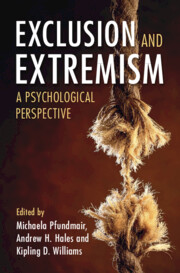Book contents
- Exclusion and Extremism
- Exclusion and Extremism
- Copyright page
- Dedication
- Contents
- Contributors
- Introduction
- Part I The Link between Exclusion and Extremism
- Part II Drivers of the Exclusion–Extremism Link
- Part III Topics Related to the Exclusion–Extremism Link
- 11 Rejection and Serious Aggression
- 12 Chronic Social Exclusion, Radicalization, and Extremism
- 13 Connecting Conspiracy Beliefs and Experiences of Social Exclusion
- Index
- References
13 - Connecting Conspiracy Beliefs and Experiences of Social Exclusion
from Part III - Topics Related to the Exclusion–Extremism Link
Published online by Cambridge University Press: 16 May 2024
- Exclusion and Extremism
- Exclusion and Extremism
- Copyright page
- Dedication
- Contents
- Contributors
- Introduction
- Part I The Link between Exclusion and Extremism
- Part II Drivers of the Exclusion–Extremism Link
- Part III Topics Related to the Exclusion–Extremism Link
- 11 Rejection and Serious Aggression
- 12 Chronic Social Exclusion, Radicalization, and Extremism
- 13 Connecting Conspiracy Beliefs and Experiences of Social Exclusion
- Index
- References
Summary
Both ostracism experiences and conspiracy beliefs have been discussed as formative ingredients of radicalization trajectories and violent extremism. The present chapter provides a brief introduction to the psychology of conspiracy beliefs and the connections made to violent extremism. In its central part, it discusses the connection between the two in discussing (1) direct evidence for ostracism experiences increasing conspiracy belief, (2) indirect evidence via highlighting how the four fundamental needs postulated to be threatened by ostracism have also been connected to conspiracy beliefs, and (3) a discussion of the reverse causation of expressing conspiracy beliefs leading to being ostracized. In all sections, specific emphasis will be dedicated to the question of how reliable and strong the available evidence is, with experimental evidence weighing heavier than correlational evidence and repeatedly replicated and meta-analytically robust effect weighing heavier than single demonstrations.
- Type
- Chapter
- Information
- Exclusion and ExtremismA Psychological Perspective, pp. 287 - 307Publisher: Cambridge University PressPrint publication year: 2024

